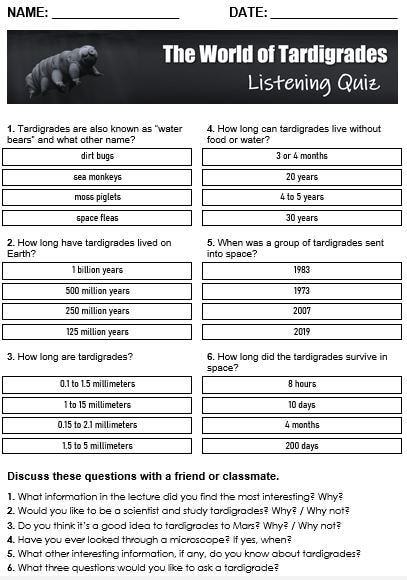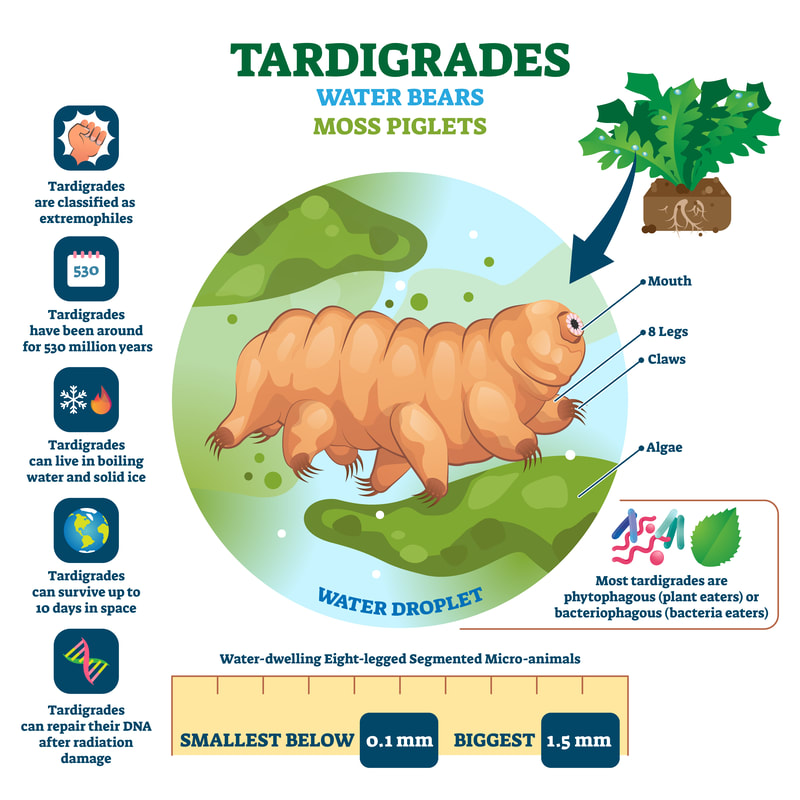Free printable PDF lesson plans, word banks, quizzes and games for EFL/ESL teachers
ADVANCED LISTENING PRACTICE
THE WORLD OF TARDIGRADES
THE WORLD OF TARDIGRADES
Audio Script
In this lesson, we'll examine one more microscopic species that has also been extremely successful in evolutionary terms: the tardigrade. Tardigrades, also known as water bears or moss piglets, are tiny, eight-legged micro-animals that belong to the phylum Tardigrada. Although they were only discovered by German zoologist Johann August Ephraim Goeze in 1773, scientists believe they have lived on our planet for at least 500 million years. This means they first emerged about 250 million years earlier than dinosaurs!
Tardigrades are incredibly small, ranging from 0.1 to 1.5 millimeters in length, no larger than the size of a period at the end of a sentence. They are clearly visible only under a microscope, or perhaps a strong magnifying glass. Yet, despite their size, they are incredibly resilient and have been found in every corner of the planet, from the highest mountain peaks to the deepest ocean trenches. It is estimated that there are about 1,300 species of tardigrades in the world, with new species being discovered all the time. In addition, scientists say that there could be as many as tens of thousands of tardigrades in a single gram of moss or soil.
One of the most remarkable features of tardigrades is their ability to enter a state of suspended animation known as cryptobiosis. When faced with adverse environmental conditions, such as extreme temperatures or desiccation, tardigrades can shrink their bodies and reduce their metabolic rate to near zero, effectively putting themselves into a state of suspended animation. In this state, they can survive for as long as 30 years without food or water, much longer than their normal lifespan of 3 to 4 months. When conditions improve, they can revive themselves from this state and resume their normal activities. How do we know this? Very simple. In 1983, two tardigrades were placed in a freezer at minus 20 degrees Celsius. When the researcher finally took them out three decades later, the tardigrades completely recovered!
Amazingly, tardigrades have also been found to survive in space. In September 2007, a group of tardigrades were sent into low-Earth orbit for 10 days. There, they were exposed to the vacuum, solar radiation, and extreme temperatures of outer space - temperatures as cold as 200 degrees below zero, Celsius. When they were returned to Earth, a significant portion of the tardigrades had survived, and some were even able to reproduce. This remarkable feat has led some scientists to speculate that tardigrades may be able to survive on other planets, such as Mars.
In this lesson, we'll examine one more microscopic species that has also been extremely successful in evolutionary terms: the tardigrade. Tardigrades, also known as water bears or moss piglets, are tiny, eight-legged micro-animals that belong to the phylum Tardigrada. Although they were only discovered by German zoologist Johann August Ephraim Goeze in 1773, scientists believe they have lived on our planet for at least 500 million years. This means they first emerged about 250 million years earlier than dinosaurs!
Tardigrades are incredibly small, ranging from 0.1 to 1.5 millimeters in length, no larger than the size of a period at the end of a sentence. They are clearly visible only under a microscope, or perhaps a strong magnifying glass. Yet, despite their size, they are incredibly resilient and have been found in every corner of the planet, from the highest mountain peaks to the deepest ocean trenches. It is estimated that there are about 1,300 species of tardigrades in the world, with new species being discovered all the time. In addition, scientists say that there could be as many as tens of thousands of tardigrades in a single gram of moss or soil.
One of the most remarkable features of tardigrades is their ability to enter a state of suspended animation known as cryptobiosis. When faced with adverse environmental conditions, such as extreme temperatures or desiccation, tardigrades can shrink their bodies and reduce their metabolic rate to near zero, effectively putting themselves into a state of suspended animation. In this state, they can survive for as long as 30 years without food or water, much longer than their normal lifespan of 3 to 4 months. When conditions improve, they can revive themselves from this state and resume their normal activities. How do we know this? Very simple. In 1983, two tardigrades were placed in a freezer at minus 20 degrees Celsius. When the researcher finally took them out three decades later, the tardigrades completely recovered!
Amazingly, tardigrades have also been found to survive in space. In September 2007, a group of tardigrades were sent into low-Earth orbit for 10 days. There, they were exposed to the vacuum, solar radiation, and extreme temperatures of outer space - temperatures as cold as 200 degrees below zero, Celsius. When they were returned to Earth, a significant portion of the tardigrades had survived, and some were even able to reproduce. This remarkable feat has led some scientists to speculate that tardigrades may be able to survive on other planets, such as Mars.
















